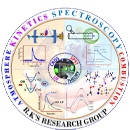Thermal decomposition of 1,2-dichloroethane (1,2-DCE) has been studied in the temperature range of 1050−1175 K behind reflected shock waves in a single pulse shock tube. The unimolecular elimination of HCl is found to be the major channel through which 1,2-DCE decomposes under these conditions. The rate constant for the unimolecular elimination of HCl from 1,2-dichloroethane is found to be 1013.98±0.80 exp(−57.8 ± 2.0/ RT) s-1, where the activation energy is given in kcal mol-1 and is very close to that value for CH3CH2Cl (EC). Ab initio (HF and MP2) and DFT calculations have been carried out to find the activation barrier and the structure of the transition state for this reaction channel from both EC and 1,2-DCE. The preexponential factors calculated at various levels of theory (HF/6-311++G**, MP2/6-311++G**, and B3LYP/6-311++G**) are (≈1015 s-1) significantly larger than the experimental results. If the torsional mode in the ground state is treated as free internal rotation the preexponential factors reduce significantly, giving excellent agreement with experimental values. The DFT results are in excellent (fortuitous?) agreement with the experimental value for activation energy for 1,2-DCE while the MP2 and HF results seem to overestimate the barrier. However, DFT results for EC is 4.5 kcal mol-1 less than the previously reported experimental values. At all levels, theory predicts an increase in HCl elimination barrier on β-Cl substitution on EC.
-
Call
-
E-mail
Journal Details
1. Unimolecular HCl elimination from 1,2-dichloroethane: A Single Pulse Shock Tube and ab initio study.
B. Rajakumar, K. P. J. Reddy & E. Arunan. J. Phys. Chem. A., , 8366, 106
